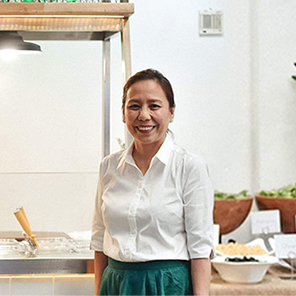The CEO of IdeasXMachina Advertising, Inc. (IXM) proudly wears a chip on his shoulder. Third Domingo, the only child of a public school teacher and a prison guard, now sits at the helm of a 120-people-strong company and counts a Japan-based global integrated marketing innovation company, Hakuhodo, as a partner.
Powered by Third’s vision, IXM has spearheaded memorable marketing campaigns for some of the country’s largest brands. They have also offered their creative services to organizations pushing for various social advocacies.
A LUBRICANT FOR SUCCESS
Third’s childhood was modest but secure. His parents, both government employees, didn’t have a lot of money but fostered a stable family environment anchored on generosity and hard work.
Third grew up watching his parents pursue opportunities to boost their income. Besides working as a prison guard, Third’s father also freelanced as a school photographer and made handicrafts like walis tambo or raffia crafts.
“We knew the value of money and how to work hard for it”, says Third. “But it’s not the amount of money you have, it’s how you use that money so you can have a meaningful life. A life where you can help others.”
In high school, Third was able to enroll in private schools like Southridge and continued on to the University of Asia and the Pacific (UA&P) via scholarships. He saw classmates with nice shoes, chauffeured to and from school, or already driving their own car. But the disparity never discouraged him. “Mahirap lang ako, pero kaya kong makipagsabayan sa sipag at talino”, declares Third.
“Poverty is a lubricant for success,” observes Third. “I lived in an environment where lahat kayo, “isang kahig, isang tuka.” That becomes your whole world. In Southridge and UA&P, I realized pwede pala ‘yung ganyang buhay. Kumportable. Now I knew that this will be my journey and it’s not going to be easy. There is no jackpot, no one big thing that will change my circumstances in life. It’s going to be a process.”
EYES ON THE PRIZE
Since then, Third’s goal was to start his own company by the time he turns 30 years old. This focus guided Third throughout his career. He first joined the McCann advertising company as an intern, became an account executive, and was absorbed as a copywriter. Through every step, he maintained a keen interest in the business side of things.
Asked how he knew that he was ready to start his company, Third says: “There is no such thing as ready ka na. It starts with confidence. Knowing na hindi ka handa, but you’ll do it anyway.”
“Just do it, but prepare yourself”, amends Third. “A lot of people spend their whole lives preparing for something but never having the courage to do it.”
“I always tell my employees: brilliance is mandatory but more than that, hard work is required. Hard work is knowing that we’re not geniuses. We don’t have some special power.”
It sounds like Third isn’t afraid of failure – and it’s true. “Everything you do is preparation for something else. It boils down to bravery, humility, and hope. When you accept failure, you can bounce back from it. And you can bounce back stronger.”
BRIGHTER VALUE OVER TIME
“When people have money, they tend to splurge it,” shares Third. But his parents have always subconsciously taught him the power of investing. One of the financial lessons his mother taught him was, if they ever got rich, Third should buy land. “Ang lupa, tumataas ang value.”
This shaped how Third approaches his finances today. He prefers investing his time, energy, and money on things “na may balik”.
“Growing from a modest background, ayaw kong gumastos. Pero negosyo na ‘to. Mauuna lagi ang investment mo.” Third talks about how he invests in technology to give his business an edge. In building a data super-intelligence team that can help their agency understand the analytics of the market, they needed a certain type of computer with 27 monitor screens to the tune of a few million pesos. “Sandali lang. May pera ba tayo? Kung meron naman, sige.”
“Most of the time, money determines our behavior,” Third points out. “But I think we should determine money’s behavior based on our goals, our vision. Money is a tool. You need to spend it and make it work for you.”
“My favorite thing now is the tree,” says Third who now owns a plot of land in Tarlac after following his mother’s advice. He explains how fruit trees and hardwood saplings are expensive. “Di mo naman agad makukuha ang benefit n’un, diba? Makukuha mo yan after four or five years. But the trees I plant are not for me. They’re for my children and grandchildren. When I’m old, I can say “apo, ako nagtanim n’yang sampalok na inaakyat n’yo.” ‘Yan ang saya na hindi mababayaran.”
GROWING AND GIVING BACK
“If you have money, you have the capacity to help other people,” notes Third. “And if you help other people, you become happy. Because you make them happy.” Punctuated with a smile, he adds: “So let’s make money.”
Happiness and welfare are at the core of Third’s company goals. IXM is notorious for having a smorgasbord of worker benefits both unique and innovative, like the ‘Undertime Pay’ giving employees financial incentives to finish their work and clock out early without sacrificing the quality of their output. The ‘Caregiver Leave’ allows employees to take paid leaves to tend to a sick loved one. ‘Love Life Benefits’ provides reimbursable date expenses, while the ‘Break Up Leave’ gives employees time to compose themselves before going back to work. If an employee gets married, IXM even pays for the wedding reception.
Even in their business operations, Third ensures that a portion of their efforts would go for social advocacies. “We support our employee’s social good projects with our own profits,” he points out. “Sa mga clients na walang pera pero may social advocacy, we charge them 1 peso per month as a retainer. Wala kaming kinikita sa kanila, pero dahil tuwang-tuwa sila sa amin, pinapakilala nila kami sa mga clients na may pera na.”
In his personal life, Third is also the founder of Malaking Munti, a youth organization that teaches kids from small beginnings to think and dream big. “Gumawa ka ng mabuti. Siguradong may balik yan,” says Third.
Third’s working-class background continues to ground him and gives him a valuable lens through which he sees the world. He understands the temptation of spending money for pleasure and comfort and the rewards of delayed gratification: making sure that his money serves him over a longer period of time. This also gives him an intrinsic and empathetic understanding of why Filipinos push forward through adversities, as well as the generosity that should go hand-in-hand with the drive for success.
“When we talk about money, we don’t actually just mean money,” says Third. “What we mean is security. What we mean is the capacity to help and provide. It’s never about whether you’re rich or poor. It’s about how you use your money and how you’re able to help others with it. No one ever became poor by sharing.


.JPG)







.png)

